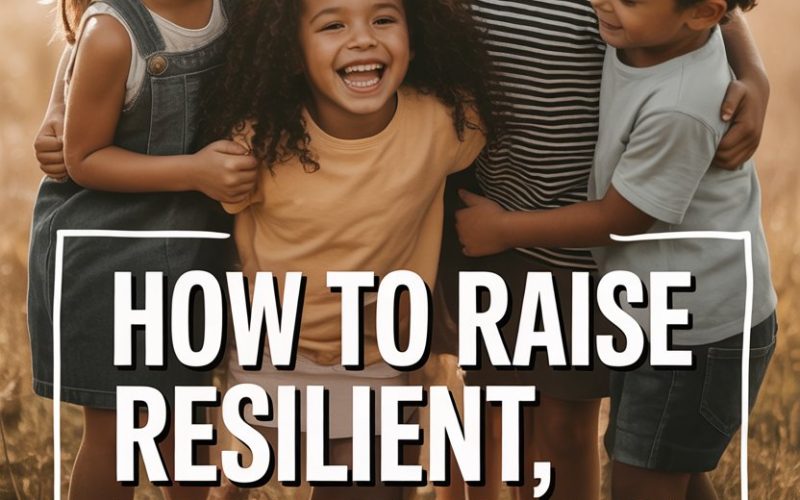Parenting comes with a daily to-do list that seems to regenerate like some sort of mythical beast: lunchboxes, laundry, lost permission slips.
Who has time to coach their child to emotional greatness between slicing apples and scraping yesterday’s porridge off the wall?
Here’s the good news—raising resilient, emotionally strong kids isn’t about having all the answers or blocking every disappointment.
It’s about the little things you do—sometimes without even realising—that help your child bounce back, stand up, and maybe even laugh at life’s curveballs.
Let’s talk about what really builds emotional strength in kids, even when parents are running on caffeine and hope.
Emotions Are Not the Enemy
Feelings, much like muddy shoes, have a way of showing up when you least expect them. And they’re not always welcome. Yet, teaching kids to label and express their emotions is the first step toward real resilience.
When your little one turns into a pint-sized volcano after losing a game, it’s tempting to distract or dismiss (“Oh, it’s just a game!”).
But research from the University of Washington shows that helping kids name their feelings—“You’re really disappointed because you wanted to win”—makes those feelings less scary and more manageable.
Turns out, feelings don’t actually explode kids. Bottling them up? That’s another story.
Model Your Own Bouncing Back
Your child’s favourite superheroes might leap tall buildings in a single bound, but there’s a real superhero in their life: you.
Kids absorb more from what you do than what you say (tragically, this applies to biscuit habits as well as emotional ones).
When you burn the dinner or spill coffee on your work shirt, narrate your response: “That was frustrating. I need a minute to cool off, then I’ll try again.”
This doesn’t mean you need to react perfectly—just honestly and calmly enough for your child to see that setbacks aren’t the end of the world.
Even narrating “Mum’s grumpy because the car wouldn’t start, but I’m taking some deep breaths. We’ll figure it out” invites your child to try those strategies next time their day goes pear-shaped.
Let Them Struggle (A Little)
If you’ve ever wanted to swoop in and rescue your child from frustration, congratulations: you’re completely normal. Resisting that urge, though, gives them the gift of struggle.
Allowing kids to face age-appropriate challenges—tying shoelaces, negotiating swings, figuring out a tricky bit of homework—helps build resilience.
As child psychologist Angela Duckworth explains, “grit” is nurtured by letting kids persist, even when they’re tempted to give up.
It’s a balancing act. Too much struggle, and they shut down. Too little, and they never build the calluses that help them try again.
Normalize Mistakes and Failure
Perfection is for unicorns and social media influencers. Kids who grow up believing mistakes are disasters often shy away from trying new things. Shift the focus: mess-ups mean you’re learning.
Create a family culture where “having a go” is celebrated. Share your own blunders (bonus points if they’re amusing). Try saying, “I made a right mess of that recipe, but now I know—no more salt in the pancakes.” Your laughter and willingness to learn from errors teaches kids that mistakes are part of the process, not a punishment.
Teach Problem-Solving, Not Just Positivity
It’s tempting to slap a cheery sticker over every disappointment (“Cheer up, you’ll be fine!”). But kids need tools, not just platitudes.
When your child faces a challenge—a tricky friendship, a missed party invite, a lost favourite toy—help them brainstorm solutions.
“What could you do next time?” or “Who could help with this problem?” gets their problem-solving muscles working. Harvard researchers have found that kids who develop these skills early can handle stress better later on.
No need to be a life coach. Just keep your questions open and your patience handy.
Foster Connection and Belonging
Resilience isn’t built in a vacuum (or a silent backseat during the morning school run). Kids need to feel connected—to you, to family, to friends, to teachers. That sense of belonging is the net that catches them during rough landings.
Family rituals, whether it’s pizza night or a shared walk, provide reliable points of connection. Even a silly handshake before bed or a secret code word can help your child feel like part of something bigger.
Research from The Center on the Developing Child highlights how strong relationships are a foundation for emotional strength.
And yes, you can still have a strong bond with a child who grunts at you over their cereal.
Encourage Trying, Not Winning
If your child thinks coming in first is more important than showing up, the pressure can squash their willingness to try. Praise effort: “You worked really hard on that,” or, “I saw you kept going, even when it got tricky.”
Celebrating effort over outcome helps kids take risks and develop a growth mindset.
Carol Dweck’s research on growth mindset shows that kids who believe effort is more important than raw talent keep trying when things get tough.
The real win? When your child is brave enough to try, even when victory isn’t guaranteed.
Encourage Healthy Risk-Taking
A scraped knee is a rite of passage, not a catastrophe. Allowing your child to try new, slightly scary things—climbing higher, joining a new club, speaking up in class—teaches them that fear isn’t a stop sign.
Every time your child takes a (sensible) risk and survives, their confidence grows. You don’t need to sign them up for bungee jumping. Sometimes, it’s as simple as letting them order their own meal at a restaurant or walk to school with a buddy.
Remind yourself: bubble wrap is for parcels, not for children.
Promote Self-Care and Coping Skills
Kids need tools to handle tough days. Coping skills look different for everyone, but simple strategies—deep breathing, counting to ten, squeezing a stress ball, cuddling a pet—go a long way.
Make these tools part of daily life, not just emergencies. If your day is spiralling, say, “I’m going to have a cup of tea and take a minute.” Little ones see self-care as normal when you model it.
For older kids, encourage creative outlets—drawing, listening to music, kicking a footy.
Dr. Stuart Shanker, an expert in self-regulation, explains in Self-Reg: How to Help Your Child that these skills build the foundation for emotional strength.
Teach Empathy and Perspective
The world doesn’t revolve around any one of us, hard as that may be to accept at age seven (or, frankly, forty-seven). Teaching kids to consider others’ feelings and viewpoints makes them more adaptable and less likely to crumble when things don’t go their way.
Encourage your child to imagine how others might feel: “How do you think your friend felt when that happened?” Simple acts of kindness—sharing, helping, saying sorry—build empathy.
Research from the Making Caring Common Project at Harvard links empathy with stronger relationships and resilience.
Empathy isn’t born overnight, but it’s worth every awkward apology along the way.
Be Consistent and Predictable (Most of the Time)
Life throws curveballs, but kids thrive on at least a little predictability. Knowing what to expect—rules, routines, reactions—makes it easier for your child to weather life’s storms.
This doesn’t mean you need to run your home like a military academy. Even the odd midnight pancake party has its place.
But when kids know the general shape of their day and the boundaries in place, they worry less and bounce back faster. A study in the Journal of Family Psychology found that consistent routines build emotional security and resilience.
No need for laminated charts (unless you’re into that). Just keep things steady-ish.
Celebrate Progress, Not Perfection
Every time your child bounces back from disappointment, show them you noticed. Celebrate small steps: the apology offered, the tears wiped away, the time they tried again after failing.
Progress isn’t a straight line—and sometimes it looks like two steps forward, one lost shoe, and a backwards leap into a mud puddle. That’s normal.
Your encouragement means more to your child than you’ll ever know—even when they pretend not to hear you.
Resilience Grows in the Small Moments
Building emotional strength isn’t about grand gestures or expensive programs. It’s about all the ordinary, messy, beautiful moments that add up to something remarkable.
Every time you listen, model calm, and let your child try (and fail), you’re laying bricks for a future where your child can handle whatever comes.
Your child doesn’t need perfection. They need you, as you are—busy, tired, and human.
And yes, you’re doing better than you think.




